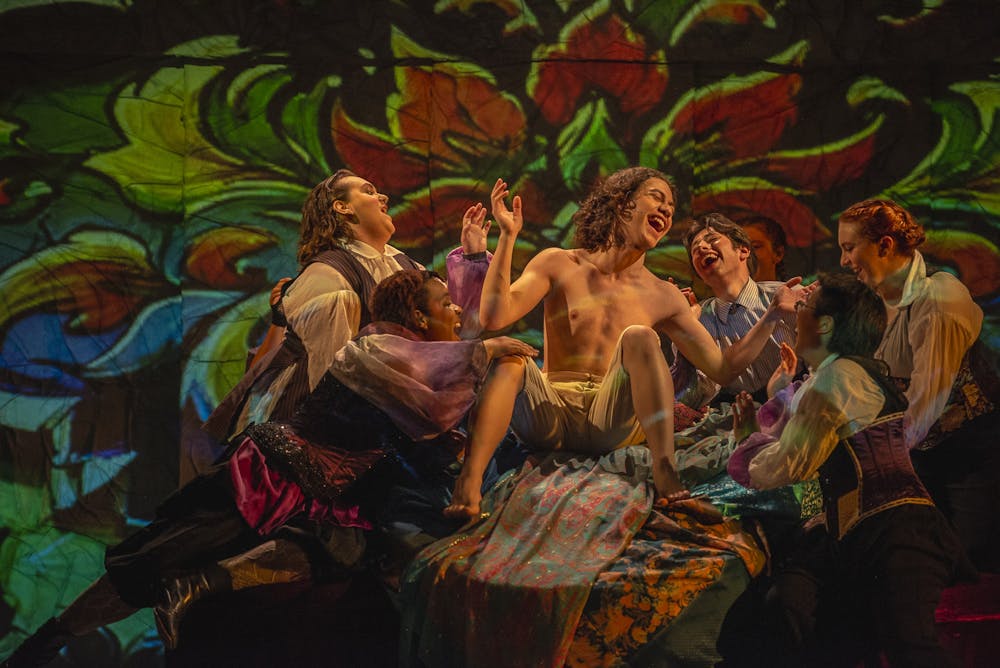In her 1929 essay, “A Room of One’s Own,” Virginia Woolf writes, “It is fatal to be a man or woman, pure and simple. One must be woman-manly, or man-womanly.” Indeed, Woolf’s genderbending reveries came alive this past weekend in Wright Theater.
“Orlando,” a play written by Sarah Ruhl based on the Woolf novel of the same name, is a shape-shifting, centuries-long exploration of life, lust and love. The production follows the titular character Orlando (Zeph Santiago ’26) and his boyish antics as a noble in the court of Queen Elizabeth (Elsa Marrian ’25) until overnight, at age 30, he wakes up as a woman.
“Orlando” is a canny investigation of gender, as shown by moments like Orlando’s transformation, during which she realizes that women “are not obedient, chaste, and scented by nature.” Ruhl’s script is clever, cheeky and requires immense creativity — qualities that the cast delivered in spades.
The show featured an eight-person chorus that operates as an extension of Orlando’s identity with members turning into various supporting characters on a dime. Their respective performances were the wind under the production’s wings, the cast carrying out an impressive balance between tight choreography and unrestrained playfulness. “Orlando” commands vulnerability, composure and unwavering confidence from its actors.
“I needed to communicate to the actors that this is a place where we can trust each other, and play, and let go, let go of what’s stopping us from expressing ourselves,” director Cláudio Meideros, chair of the theater department, told The Campus. “I mean, that’s what this play is about.”
The chorus of supporting actors rose to the challenge. Marrian was a show-stopping, bejeweled and glamorous queen with “the stomach of a king,” Ryan Ulen ’26 became an amorous and gracious Marmaduke, and Jamie Schwartz ’27 was a sultry Sasha with a perfectly controlled Russian accent. Santiago was luminous in the lead role, commanding the stage with masculinized grace and feminized strength. The cast played off one another with expert ease and successfully captured the many facets of the charm of “Orlando.”
Above all, “Orlando” champions the pleasures of living a life in full. The production sparkles with queer flourishes and poetic introspection. Woolf’s novel was inspired by her lover, Vita Sackville-West, and commemorates West as charismatic, dynamic and reflective.
“More than anything, this show is a love letter, period,” Santiago told The Campus. “And what better way to bring joy to your community than by playing a literal love letter?”
Medeiros agreed. “I was very focused from the beginning on joy,” he said. “If this play was going to have an impact, it would have to be joyous, it would have to be a celebration of queer joy.”
The theme of queer joy informed every aspect of the production; the acting, set design, lighting, costuming and makeup were all unified by rhapsodically queer stylings. The stage was set against a backdrop resembling crumpled paper, creating a sense that “Orlando” had cracked the spine of Woolf’s novel and was playing off the page.
“The stage was great because it wasn’t busy. It was just the doors, projection, and just a sandbox, essentially,” Santiago said. “It was so freeing to be on a stage with so much space and it was also demanding because us as actors had to take up that space at every given moment. A show like this lends itself to the people being the space.”
The actors took charge of the stage with their talent and incredible makeup, hair and costumes. Because “Orlando” spans five centuries, the makeup, hair, and costuming signaled with grace (and tremendous style) the ruling trends and attitudes of each era in “Orlando,” from Elizabethan trunk hose to flapper-esque bobbed hair. The play frequently refers to how each distinct “spirit of the age” influences Orlando’s tastes and relationships.
“The costuming was gorgeous and really informative for me,” noted Santiago. “Gender binaries so rule the different periods that Orlando goes through and so by dressing as [a] nobleman, I was like ‘oh I feel what this is doing to me physically’ and that was so nice to lean into.”
Santiago donned many costumes – he and I agreed that our favorite was Orlando’s blue Victorian dress – and wigs to communicate the character’s metamorphosis, while the chorus wore cinched corsets and makeup that would make Trixie Mattel blush to chauffeur the audience’s joyride through the many transformations of “Orlando.”
In a time when rethinking gender norms has almost become the norm, “Orlando” is a story that resonates deeply. For many, opening a laptop to watch an episode of “Drag Race” or to rewatch “Bottoms” is a welcome respite, but there’s no denying that seeing queerness embodied live by your friends, classmates and professors is nothing short of magical.
Catherine Goodrich '24 (she/her) is a Senior Arts and Culture Editor.
Catherine previously served as an Arts and Culture editor and Staff Writer. Catherine is an English and Film double major hailing from Birmingham, Alabama. She is the prose editor for the Blackbird Literary Arts journal and works concessions at the Middlebury Marquis where she has developed a love for trivia and making nachos.




